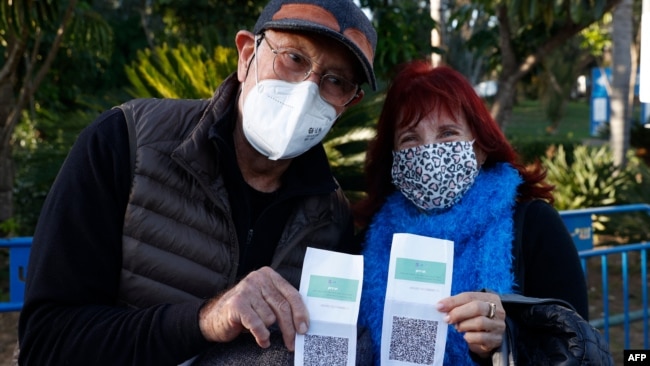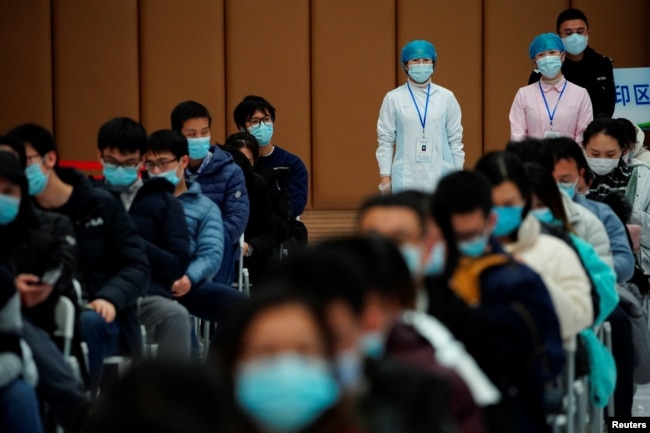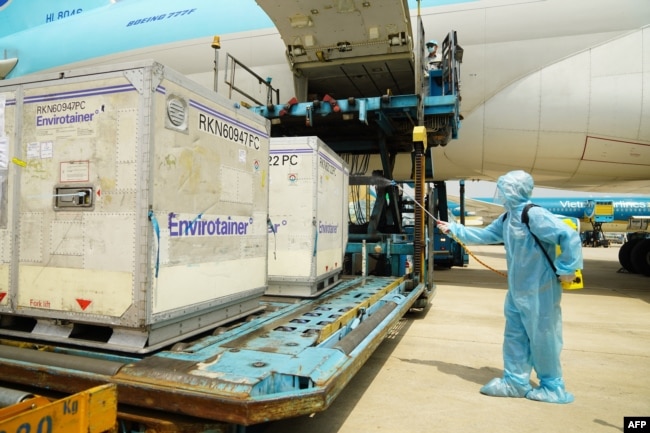世界的集団免疫獲得はいつ
世界が、ワクチン接種に望みをかけている現状ですが、確かに世界レベルでの集団免疫獲得には長い道のりですね。
ワクチンパスポートなるものが聞こえてきますが、安全はどこにもないのが現実です。
すぐに使える豊富な表現が山盛りの今日のVOAニュース
早速聴きましょう♬
- 集団免疫に到達したとき、どのようにしてわかるのでしょうか?
- 英語の小窓 ”what if ”
- How Will We Know When We Reach Herd Immunity?
- Words in This Story
集団免疫に到達したとき、どのようにしてわかるのでしょうか?
How Will We Know When We Reach Herd Immunity?
February 25, 2021
集団免疫に到達したときに、どのようにしてわかるのだろうか?
政府がCOVID-19の拡散を止めるために世界中の人々にワクチンを接種しようとしているとき、人々はこのような疑問を抱いています。
集団免疫とは、ある地域社会の多くの人々が感染から回復した時か、ワクチン接種を受けた時のどちらかになることです。集団免疫とは、すべての人がウイルスから保護されるということではありません。これは、コロナウイルスが簡単には広がらないことを意味し、危険にさらされている人たちを保護するのに役立ちます。
人々が病気になったり、ワクチンを受けとると、抗体を作り始めます。専門家は、抗体を持つ人の数が70%以上になると、集団免疫になると考えています。
しかし、ウイルスは常に変化しており、新しい変異種に発展しています。保健当局は現在、最初に発見された英国、南アフリカ、ブラジルの変異種が世界中に広がっていることを懸念しています。
免疫が必要な人の割合はどのように計算するか?
1人の感染者から平均して何人の人がウイルスをキャッチするかを知ることは、集団免疫を理解する上で重要です。
エモリー大学の感染症専門家であるウォルター・オーレンスタイン博士。彼によると、免疫が必要な人の割合は、いくつかのことに依存するといいます。住んでいる場所によって、その数は異なる可能性があります。しかし、正確な数字ではありません。
「64.9がひどい、70.1が素晴らしいということではありません。」と彼は言いす。
集団免疫に達した時、どうやってわかるのだろうか?
専門家は、大きな発表はないだろうと言っています。
新規感染が大幅に減少し、治療のために病院に行く必要のある人が少なくなったときに証拠が出て出るでしょう。
数字は、世界のどの地域にいるかによっても違ってくるでしょう。
例えば、インドでは、科学者たちは、農村部に住む人々よりも都市部に住む人々の方がウイルスから保護される必要があると考えています。ウイルスは、人口密度の高い都市部では容易かつ迅速に拡散します。
インドでは、14億人のうち何人がすでにウイルスから回復しているのかを調査しています。現在のワクチンがウイルスに対して効果を発揮すれば、集団免疫に到達するためにワクチンを接種する必要がある人は少なくなるでしょう。
ウイルス変異種はどのように集団免疫に影響を与えるのでしょうか?
ワクチンや過去の感染による抗体が人々を再び病気になることから守ってくれるのであれば、急速に広がっている変異種は大きな懸念材料ではありません。
しかし、現在のワクチンが変異種に対する効果が低い場合、製薬メーカーは、より効果的なワクチンを作るために注射を更新しなければならないでしょう。そして、さらに多くの人々がワクチン接種を受ける必要があるでしょう。
科学者たちはまた、新しい変異種の発生を防ぐために、できるだけ早く人々にワクチン接種をすることに懸念を持っています。
集団免疫は世界的なものである必要があるのか?
そうです、世界中で集団免疫を達成することは重要です。しかし、世界の一部の地域では、他の地域よりも長くコロナウイルスと闘うことになるでしょう。
世界保健機関によると、今年はおそらく世界中で集団免疫は実現しないだろうとのことです。それは豊かな国が2021年に作り出されるワクチンのほとんどを予約したからです。貧しい国はもっと待たなくてはならないでしょう。
専門家は、国によってワクチン接種のレベルが異なるため、ウイルスが完全に終息することはないだろうと言います。
集団免疫は消耗するのか?
専門家は、初期の感染やワクチンによる免疫は数ヶ月間持続するはずだと考えています。しかし、将来的にはブースターとして知られるフォローアップ注射が必要になる可能性があります。
季節性のインフルエンザウイルスは常に変化しています。そのため、毎年インフルエンザの予防接種を受ける必要があるのです。コロナウイルスも変化していますが、そう簡単には変化しません。ですから、毎年COVID-19の予防接種を必要としない可能性があります。
ワクチンが人々を病気から遠ざけることができないとしたら?
ファイザー・バイオンテック社とモデナ社の現在のワクチンは非常によく効いているようです。これらのワクチンは人々が病気になるのを防いでいます。
しかし、ウイルスが人から人へと移動するのをどれだけ阻止できるかは明らかではありません。しかし、専門家は、これらのワクチンはウイルスの拡散を減らすのに役立つはずだと言っています。
デボラ・フラー氏はワシントン大学のワクチン専門家です。彼女は、人々が病気になった場合、ワクチンがウイルスを他の人に広げる時間に制限をするだろうと述べています。
英語の小窓 ”what if ”
What if the vaccines do not keep people from getting sick?
とっても便利なフレーズですよね。
what if + 文
不安 ”もし~ならどうする?、もし~ならどうなる?”
提案 ”~したらどうかなぁ?
"それが何か?" 的な表現や、
what -if で名詞や形容詞に。
・不安
What if it rains tomorrow? もし明日雨が降ったらどうする?
What if the train is late? もし電車が遅れたらどうする?
What if I don't pass your exams? もし試験に合格できなかったらどうしよう。
・提案
What if we try? やってみたらどうかなぁ。
But what if it works out? でもさ、うまくいったらどうよ?
・ピキってきたとき
So what if? だから何?! <(`^´)>
So what if I come home late? 遅いからって何よ?!
・what-if ハイフンでつないで名詞、形容詞に。
Don't worry about what-ifs.
ああだったら、こうだったらどうしよう、なんてくよくよするなって。
って、感じで使えちゃうんですね。
what-if story 仮の話
超便利!!! ジャンジャン使っちゃおう!!!♫
How Will We Know When We Reach Herd Immunity?
 Israelis show their "green pass" (proof of being fully vaccinated against the coronavirus) before entering the Green Pass concert for vaccinated seniors, organized by the municipality of Tel Aviv, on February 24, 2021. (AFP Photo)
Israelis show their "green pass" (proof of being fully vaccinated against the coronavirus) before entering the Green Pass concert for vaccinated seniors, organized by the municipality of Tel Aviv, on February 24, 2021. (AFP Photo)
How will we know when we reach herd immunity?
That is the question people are asking as governments race to vaccinate people around the world to stop the spread of COVID-19.
Herd immunity is when a large number of people in a community will either have recovered from infection or been vaccinated. Herd immunity does not mean everyone is protected from the virus. It means that the coronavirus can no longer spread easily, helping to protect those who are at risk.
Once people are sick or receive the vaccine, they start to develop antibodies. Experts think the number of people with antibodies needs to reach 70 percent or more for herd immunity.
However, the virus is always changing and developing into new variants. Health officials are now concerned with variants first discovered in Britain, South Africa and Brazil spreading around the world.
How do you calculate the percentage of people who need to be immune?
Finding how many people, on average, catch the virus from one infected person is important to understanding herd immunity.
Dr. Walter Orenstein is an infectious disease expert at Emory University. He said the percentage of people who need to be immune depends on a number of things. The number could be different depending on where you live. But it is not an exact number.
“It’s not 64.9 is terrible and 70.1 is fantastic,” he said.
How do we know when we have reached herd immunity?
Experts say there will not be a big announcement.
The evidence will come when there is a large decrease in new infections and fewer people need to go to the hospital for treatment.
The numbers will be different depending on what part of the world you are in.
For example, in India, scientists believe more people will need to be protected from the virus in cities than those who live in rural areas. The virus spreads easier and faster in densely populated cities.
India is working to find out how many of its 1.4 billion people already have recovered from the virus. And if current vaccines work well against the virus, fewer people will need to be vaccinated to reach herd immunity.


